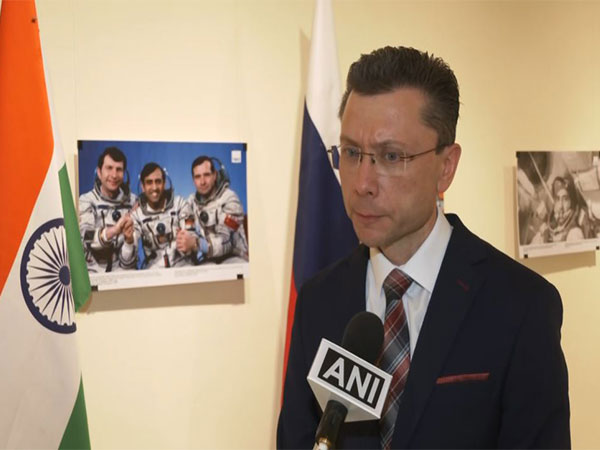Russian Deputy Chief of Mission Roman Babushkin hailed India’s remarkable achievements in space exploration and underscored Russia’s unwavering support for its space endeavours. On the 40th anniversary of the spaceflight of the first Indian cosmonaut, Rakesh Sharma, aboard the Soviet spacecraft Soyuz T-11 in 1984, Babushkin emphasised the enduring partnership between Russia and India in the space sector.
Babushkin’s remarks also highlight the success of the Chandrayaan-3 mission and the collaborative efforts in the Gaganyan project. “Russia has always been favouring Indian success,” Babushkin told ANI, emphasising the historic collaboration symbolised by figures like Rakesh Sharma.
Notably, he commemorated the achievement of Rakesh Sharma, who etched his name in history as India’s first astronaut. He lauded India’s independent space research programme, which not only benefits the nation but also extends assistance to other countries in satellite launches.
Speaking ahead of the 77th anniversary of diplomatic relations between the two countries, Babushkin highlighted Russia’s unwavering support for India’s space endeavours, emphasising India’s significant milestones in the field.
From Chandrayaan-3’s recent triumph to the ambitious Gaganyan mission, Russia has played a pivotal role in nurturing India’s space capabilities, including training astronauts and aiding in spacecraft development.
“The space domain stands as a testament to our special and privileged strategic partnership,” he also said, addressing the gathering at the Russian embassy here on the occasion.
“Russia, as a pioneer in space exploration, has always favoured Indian success. Our engagements date back to 1975, when the Soviet Union helped launch Aryabhata, India’s first satellite. The second satellite, Bhaskara, was launched by the Soviet Union in 1979,” he added.
Mentioning India’s Chandrayaan Mission, he went on to say, “Now India, having developed its robust national space programme, by right enjoys the status of a space super-power, well-reputed, reliable and preferred global partner for space science and satellite launching. The successful Chandrayaan-3 project is a huge landmark.”
Speaking further on the India-Russia space collaboration, Babushkin underlined the ISRO and Roscosmos cooperation. “Russia remains one of India’s leading partners. The Russian State Corporation ‘Roscosmos’ and ISRO are deeply involved in the implementation of the Indian Gaganyan mission by training astronauts, providing assistance in the development of manned spacecraft, supplying life-support and crew-escape systems, flight suits, couches, rate sensors, cooperating on thermal protection coatings, applied materials and space medicine capacity building,” the diplomat said.
“Our vibrant partnership includes space propulsion engineering, cryogen engine construction, satellite navigation, and establishing ground stations for receiving communication signals. We are exploring new tracks emanating from the prospects of wider involvement of the private sector and start-ups,” he added.
Babushkin further highlighted how India and Russia ‘closely coordinate’ at the dedicated multilateral platforms, first of all the UN and its Outer Space Committee. He also went on to underline how the month of April holds a reason to celebrate.
“We maintain in-depth dialogue to prevent arms races in outer space and promote the Russian initiative of non-placement of weapons in outer space. This is also part of our agenda in BRICS, including the agreement on the remote satellite constellation’, he said.
“We have many reasons to celebrate this month, including the 63rd anniversary of the first human space journey by the legend Yury Gagarin on April 12 as well as the 77th anniversary of the establishment of Russia-India diplomatic relations on April 13. More and the Russian presidency in the expanded BRICS. However, the theme of space and the historic importance of the great deed by Rakesh Sharma epitomising the spirit of our friendship deserves to be an undoubted background for our overall cooperation in 2024,” he added.
On Wednesday, the Russian Embassy and TASS News Agency jointly arranged a dedicated photo exhibition that included a unique archive of photographic materials, along with the screening of the documentary “How I Became a Cosmonaut.”
Rakesh Sharma went on to become the first Indian citizen to reach outer space when he flew aboard the Soviet rocket Soyuz T-11 launched from Baikonur Cosmodrome.
He spent 7 days, 21 hours and 40 minutes in space and took India to become the 14th nation to travel to outer space. Sharma’s work was mainly in the fields of biomedicine and remote sensing.
Sharma conducted several scientific studies and experiments, including remote sensing and biomedicine. The crew even held a conference with officials from space. When the then PM of India, Indira Gandhi, asked Sharma how India looked from outer space, Sharma said, “Saare Jahaan Se Achcha. (ANI)














